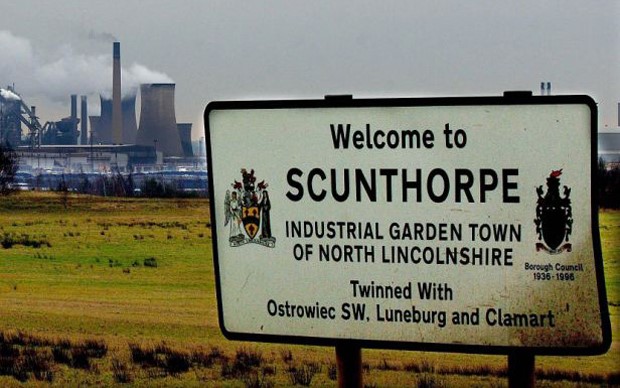1 February 2018
Get Lewis
The Scunthorpe set
by J.R.Thomas
 The editor may well think that this column has an unnatural obsession with crime; but as crime is one of the most popular genres of fiction we will risk our readers’ moral fibre yet again; a serious risk this time, via a forgotten English crime writer who wrote a best seller you may never have heard of – not under the title he gave it, anyway.
The editor may well think that this column has an unnatural obsession with crime; but as crime is one of the most popular genres of fiction we will risk our readers’ moral fibre yet again; a serious risk this time, via a forgotten English crime writer who wrote a best seller you may never have heard of – not under the title he gave it, anyway.
That writer was Ted Lewis, born in Manchester but brought up in Barton upon Humber, a small industrial town on the Humber opposite Hull, but more relevantly for Lewis, not far from the great steel town of Scunthorpe. If Mrs May wants to make a case for grammar schools she could refer to Lewis; although from a working class background he had highly aspirational parents who made sure he got into Barton Grammar School. There his English master was Henry Treece, distinguished poet and prolific writer of childrens’ history books, who saw a spark in young Edward Lewis and nurtured it. Barton Grammar during Treece’s tenure had the best English “O” level results of any state school in England – over to you Mrs May. Young Lewis went off to Hull Art School, and then followed the almost inevitable trek south, into the London advertising business. He always wanted to write; he began aged 24 with a slow selling autobiographical novel, but then wrote an extraordinary psychological examination of a provincial bad boy turned enforcer for two London Kray-like brothers.
That novel is Jack’s Return Home. Lewis had read a great deal of American crime fiction of the gritty reality school – and admired what in the States was and remains a serious and advanced form of writing.
Jack, long living in the south, returns home to a lightly disguised Scunthorpe to investigate, then avenge, the murder of his brother. He takes his home town apart without fear or mercy, taking revenge on not only his brother’s killers, but several others who have upset him. What makes the book so grippingly enticing is the gradual revelation of Jack’s own guilt about the way he treated his brother before he headed south. It is dark, sparse, unsettling, violent, and utterly realistic as to criminal life in the post war years; Lewis had invented Brit-noir. Sound at all familiar? In 1970 Mike Hodges made the book into a best-selling film, moving the action to Newcastle upon Tyne but otherwise adhering closely to the book – indeed Ted Lewis was closely involved with the making of the film under its new name Get Carter, with Michael Caine as Carter and the sublime Ian Hendry as Eric.
Lewis became a best seller. Jack Carter’s life was explored twice more, not so powerfully, in prequels to form a trilogy. But Lewis was writing very much of his own demons. He became a big earner, but an even bigger spender, with an addiction and adoration of booze and birds; in spite of an initially happy marriage and two daughters, the alcoholism which had stalked him his whole adult life took over. He could not write without alcohol but with it became aggressive, abusive, always up for a fight, and unreliable. (Mrs May: on reflection, perhaps not.) His generous attitude to the needs of beautiful ladies and his failure to appreciate those of the taxman brought him to financial ruin; in fact, maybe worse than that, to living back with his mother in Barton upon Humber. There he wrote his last and greatest book, GBH, a furious, despairing, and violent thriller about a gangster watching his crime empire disintegrate from his hideaway on the Humber. It is a remarkable achievement especially given Lewis’s alcohol intake and physical state; he died in 1982 shortly after finishing it, of a heart attack. He was 42.
Brit-noir is Lewis’s legacy, a new form of brutally realistic writing which has survived and prospered, mutating into many TV serials – The Fall on BBC is a recent addition and most Scandi detective series derive directly from it – as well as reams of crime writing, most of it not a patch on Lewis’s output. Apart from Get Carter his books are out of print.
Ten years ago Nick Triplow, a writer who had moved from London to Barton upon Humber, began to explore Lewis’s life – with difficulty as most of his papers have been destroyed. But one advantage of dying young is that even forty years later there are plenty of people around who remember you, and from a range of memories Triplow has written an fascinating memoir of a man who seemed nothing more, but nothing less, than a character in his own novels. That too is well worth a read; maybe not with a beer though.
“Getting Carter” by Nick Triplow was published last November in hardback and is widely available. “Jack’s Return Home” (aka “Get Carter”) is available in paperback. The other Carter novels and “GBH” are out of print though a good bookshop may get copies from publishers stock – I understand that they are likely to be reprinted shortly.


